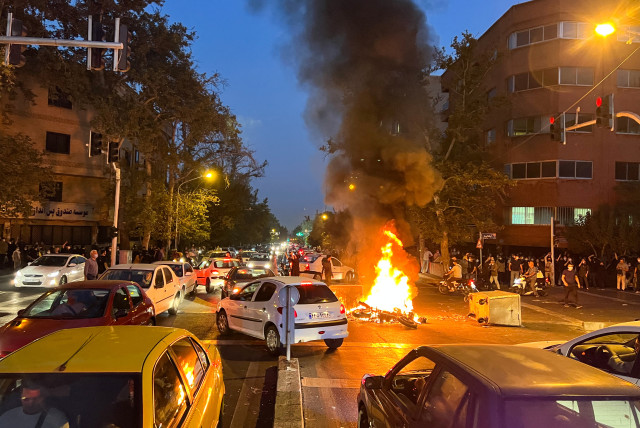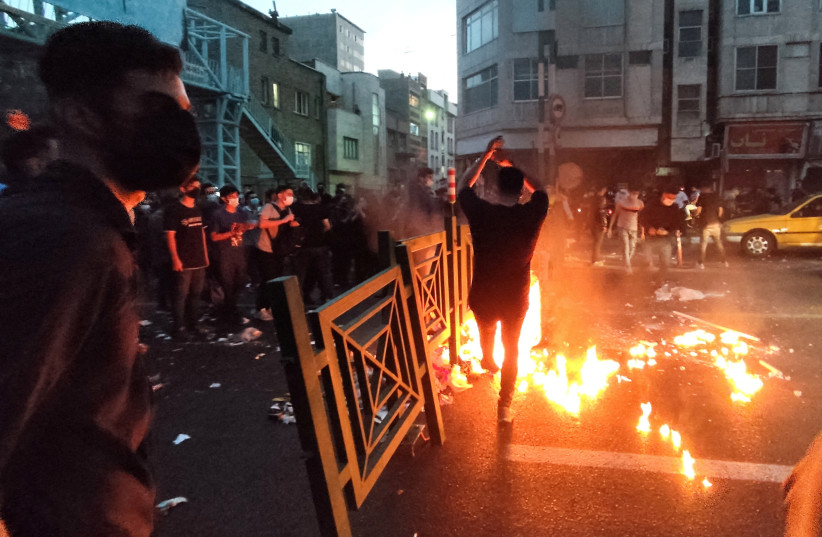Would Iran's regime mass execute arrested protestors? -analysis

As of Sunday, Iran’s judiciary sentenced five people to death in what human rights activists deem sham trials.
Since the 1979 Islamic revolution unfolded in Iran, the clerical regime showed no reticence in imposing spectacular levels of violence on peaceful protestors.
The mass arrest of Iranian demonstrators since the start of the mid-September nationwide protest against the theocratic state in response to the alleged murder of the 22-year-old woman Mahsa Amini raises a pressing question: Will the ruthless Islamists who rule Iran carry out mass executions of the protestors who are packed into the nation’s vast penal systi
How many have been arrested and sentenced to death?
According to the Human Rights Activists News Agency (HRANA), Iran's regime has killed at least 348 protesters and arrested 15,900. Dozens of children have been murdered in the regime's violent crackdown. Amini, who died on September 16, was reportedly tortured in the custody of the Islamic Republic’s infamous morality policy for failing to comply with the Islamic dress code that prescribes she properly cover her hair with a hijab.
As of Sunday, Iran’s judiciary sentenced five people to death in what human rights activists deem sham trials. Four protestors were sentenced to death on the nebulous charge of “enmity against God.” Amnesty International said at least 21 detainees are facing the death penalty under the Islamic Republic's Sharia-based legal system for charges including "enmity against God" and "corruption on Earth".
Iran's history of mass executions
Lawdan Bazargan, an Iranian-American political and human rights activist, told The Jerusalem Post that “History shows that [the] Islamic Republic of Iran will execute prisoners with the bogus charge of ‘Mohareb’ (someone who wages war against God) to create fear and force people to submit. We had the mass executions of the 1980s, the Massacre of 1988, the executions after the 2009 Green Movement, the 2017 protests, and the 2019 uprising. Right now, all the former political prisoners of those past uprisings, people like Majid Tavakoli, Hossein Ronaghi, Arash Sadeghi, Toomaj Salehi, Golrokh Iraee, and thousands of others have been arrested, and we are fearful for their safety.”

Mizan Online, the website of Iran’s Revolutionary Court, announced on Sunday that the court issued a death sentence linked to the "riots."
The regime-controlled media outlet aid the death penalty was imposed on the person for "setting fire to a government building, disturbing public order, assembly and conspiracy to commit a crime against national security, and an enemy of God and corruption on earth."
A legal system devoid of rights
Human Rights organizations have long argued that the Iranian regime’s opaque judicial system is woefully inadequate and does not meet international norms for fair judicial proceedings and trials.
"Protesters don't have access to lawyers in the interrogation phase, they are subjected to physical and mental torture to give false confessions, and sentenced based on the confessions," the director of the Oslo-based Iran Human Rights, Mahmood Amiry-Moghaddam, told the French global news agency AFP.
The urgency of the fate of the imprisoned protestors was captured in a Fox News Digital report on Tuesday. The article’s headline reads: “Iran may use mass executions to quell anti-hijab protests across country, human rights group warns.”
Bazargan is well-versed in the sheerlawlessness of Iran’s regime. She was incarcerated in Tehran’s brutal Evin prison in the 1980s for her political dissident activities. Her brother, Bijan, was murdered in the bloody summer of 1988 when at least 5,000 Iranian dissidents were wiped out in the Islamic Republic’s vast prison system.
"In the 1980s, under the pretense of Revolution and War, the Islamic Republic of Iran could execute hundreds of people a day without fear of reprimand by the International community, but now IRI cares about its image. [Ali] Khamanei [Supreme Leader of IRI] knows that without International support, it can not continue its ruling, so the pressure from the West, UN, and human rights agencies will force IRI to stop executions, "said Bazargan.
Calls to change a cruel system
Daniel Pipes, the prominent historian who oversees the Philadelphia-based Middle East Forum, told the Post "The protests have excellent timing. For one, Khamenei's poor health means he could be gone any day. For another, Iranian military support for Putin's invasion of Ukraine has unprecedentedly turned Western opinion against Tehran. These two wild cards give the protests an unpredictable opportunity."
Hamid Charkhkar, an Iranian American academic, told the Post “If we have learned anything about Iran's regime over the last few decades, they are not afraid of killing innocent citizens and spreading terror within and outside the country. Shockingly, the members of the so-called parliament voted in favor of the execution of protesters. I have no doubt that they have every intention of carrying out such a brutal and inhumane ruling. At the same time, the regime officials are scared. They know well the more blood they spill, the more determined people become to fight against them and eventually overthrow the entirety of this cruel system. The regime's reign of terror has lost its power. People shout in the streets: 1000 more people will join this fight if you kill one of us. “
Charkhkar urged a process of regime change, including a halt to the Iran nuclear talks. He said ”By now, we know well that the government in Iran only succumbs to pressure. That is the only language they understand. For the last two months, the world has observed firsthand that the Iranian government has no legitimacy and is not afraid of killing its own people. Therefore, the same old diplomacy is no longer an answer. The West should recognize the Iranian opposition and support the Iranian people in their fight to change this regime. Unfortunately, we still hear from some US officials that Iranians are seeking reform, which shows a big misunderstanding of what's happening inside Iran. The European countries must expel the regime diplomats, terminate any negotiations with the regime, and make it clear that they will not deal with an illegitimate government.”









.jpeg)
Comments
Post a Comment